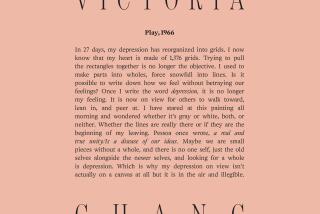RHAPSODY IN PLAIN YELLOWBy Marilyn ChinW.W. Norton:...
RHAPSODY IN PLAIN YELLOW
By Marilyn Chin
W.W. Norton: 128 pp., $22
Like a whirling acrobat-musician from the Peking Opera--sounding brass gongs and blue ululations of joy and melancholy--Marilyn Chin lands blazing before us with “Rhapsody in Plain Yellow.” It’s difficult to describe a book this ambitious in style and syncopation. “Rhapsody” casts its irreverent gaze on shifting landscapes of love and lamentation. The title poem (which mocks, we are told, the ancient “fu” form, characterized by long poetic exposition) holds nothing back:
And you, relentless Sinophile,
holding my long hair, my frayed dreams,
My turn to objectify you
the lunatic, the lover, the poet....
We hear a much quieter voice in the quasi-elegiac “That Half Is Almost One”:
In my thirtieth year
I wrote a letter to my mother
I had forgotten the character for “love.” I remember vaguely
the radical “heart.”
This radical heart beats in polyphony in the poems, addressing Li Po, Emily Dickinson and others in “talking blues,” dirge, psalm and dance beat. A mother and grandmother are mourned, destiny questioned, nostalgia courted and exiled, as the cumulative effect of Chin’s dazzling longing creates a past that becomes essential to our understanding of her elliptical and passionately insistent poetic statement.
*
SLEEPING WITH THE DICTIONARY
By Harryette Mullen
University of California Press:
98 pp., $14.95
“Sleeping With the Dictionary” is another exuberant book, though its high spirits are more avant-garde. Mullen’s voice is insouciant, parodic and, at times (in contrast to its general clever jocularity), a little uncarbonated.
Poetic expression here springs from a formal device, a game, a premeditated romp: a little like the Muse playing Scrabble. Mullen employs acrostics, anagrams, parodies, homophones, echolalia and puns. The politics of language and dialect provide Mullen’s major themes, though this sounds deadly (as does her announced manipulation of Roget’s Thesaurus and the American Heritage Dictionary). Yet she gets the whole contraption, (note the fast anagrams here, for example, “Tokyo,” “OK toy”) to shimmy and fizz:
El Nino brought a typhoon of tom-tom’s from Tokyo, where
a thrilling instrument makes an OK toy. Tiny violins are
shrill.
And in slo-mo, emotional but punning detail:
This dream is not a map.
A poem is not the territory.
The dreamer reclines in a barber shop
carpeted with Afro turf.
In the dark some soul yells.
“Sleeping With the Dictionary” may be lexicon lust, but it’s no one-night stand.
*
SUBTERRANEAN
By Jill Bialosky
Alfred A. Knopf: 96 pp., $23
Jill Bialosky’s “Subterranean” (though filled with plangent importunings directed to the god of sudden change, requesting amnesty) offers a solid presence. The poems have a stately bearing. Love and death are given their usual enshrinement, but not in the abstract. A child crunches Cheerios in these poems; Quaaludes and Barbies co-habit comfortably. In the poems’ architecture, long and short lines also cohabit. An example of the latter:
Imagine, desire gone,
no longer essential.
Not touch, perhaps one luxury--
memory to sustain her.
As the title suggests, the world examined by these poems lies just below the surface of the quotidian and that world (always sensed, rarely acknowledged) is full of peril and passion. Everything here is seen as though under a magnifying glass in harrowing, gorgeous detail.
More to Read
Sign up for our Book Club newsletter
Get the latest news, events and more from the Los Angeles Times Book Club, and help us get L.A. reading and talking.
You may occasionally receive promotional content from the Los Angeles Times.







